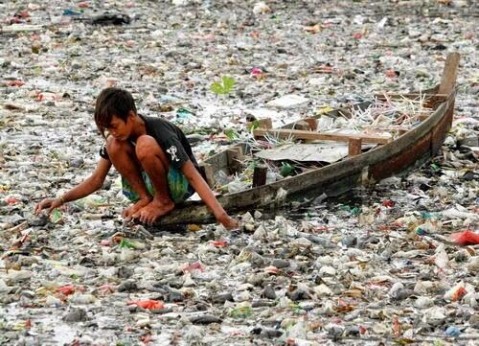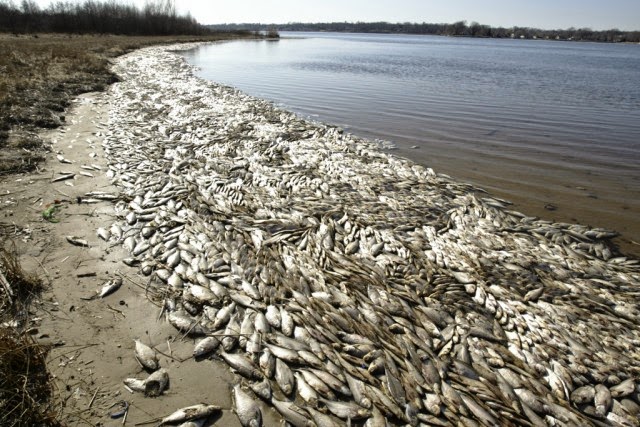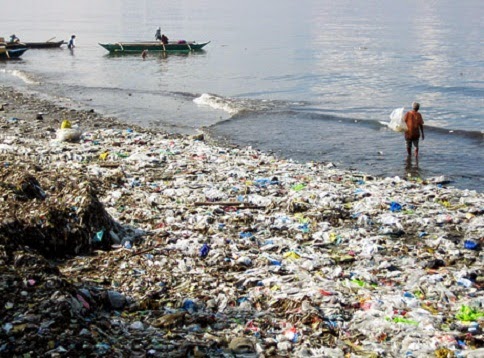Ngược lại, mặt khác lại có khuynh hướng biện minh rằng các “tổ chức tập đoàn lợi nhuận tư hữu” đã từng giải quyết nhiều “vấn đề” cho xã hội nhân loại. Chúng ta cũng đã thấy “kết quả” và những giải quyết của những “tập đoàn lợi nhuận tư hữu” này như thế nào trong hàng chục ngàn năm qua..
Chiến tranh, đàn áp, bóc lột, tàn hủy … chưa bao giờ ngưng nghĩ, mà càng ngày càng tinh tế hóa và bao quát hơn trước. Những cuộc cách mạng lớn nhỏ đẫm máu, không phải tự nhiên bùng nổ từ cung trăng! Chủ nghĩa cộng sản hay chủ nghĩa xã hội, không phải tự nhiên xuất hiện không nguyên cớ.
 Tất cả các lập luận đều vô tình hoặc cố ý bỏ quên một sự kiện thường trực của xã hội con người nói chung (trừ một số nhỏ biệt lệ sống tách biệt như Amazon hay một số cộng đồng tự trị ngắn ngủi trong vài thời đoạn ở Âu châu- trước khi bị quyền lực chính trị khống chế).. đều nằm dưới quyền lực nhà nước, dù là vua chúa, độc tài, hay dân chủ ….
Tất cả các lập luận đều vô tình hoặc cố ý bỏ quên một sự kiện thường trực của xã hội con người nói chung (trừ một số nhỏ biệt lệ sống tách biệt như Amazon hay một số cộng đồng tự trị ngắn ngủi trong vài thời đoạn ở Âu châu- trước khi bị quyền lực chính trị khống chế).. đều nằm dưới quyền lực nhà nước, dù là vua chúa, độc tài, hay dân chủ ….
Với đại đa số, khi phải đặt vấn đề “xã hội” với họ, câu trả lời vẫn là ” Tôi chẳng có giờ quan tâm, tôi phải cần lo cuộc sống của tôi trước, ngày 3 bữa ăn, giải trí, ăn nhậu vui vẻ du lịch là quá đủ rồi”
Nhìn lại chặng đường “phát triển” của nhân loại từ đơn bào vi khuẩn cách đây hàng ngàn tỉ năm sau “cái Nổ Lớn”(Big Bang Theory) hình thành vũ trụ đến sự hiện hữu của thủy sinh vật (cá), loài người tiến hóa từ cá cho đến vượn và rồi khai triển khối óc của người vật, với ý niệm nhân bản để thành Người, chúng ta đã “tiến bộ” rất ít… nhưng hủy diệt thật nhiều, hủy diệt không chỉ nhiên giới mà hủy diệt chính cái giá trị cao nhất mà chúng đặt ra cho cuộc tiến hóa của chúng ta NỀN NHÂN BẢN.
 Chúng ta không có thống kê rõ rệt về số lượng và mức nhận thức của quần chúng toàn cầu về vấn nạn này. Dù vậy, ở mức độ giao tiếp thể hiện, bằng chứng quan sát, cũng cho chúng ta thấy mức độ quan tâm của một khối dân chúng nhận thức tại các xã hội Âu Mỹ luôn rộng hơn và cao hơn so với các xã hội Á, Phi. Đây là một tia hy vọng nhỏ bé sau hàng chục ngàn năm hủy hoại.
Chúng ta không có thống kê rõ rệt về số lượng và mức nhận thức của quần chúng toàn cầu về vấn nạn này. Dù vậy, ở mức độ giao tiếp thể hiện, bằng chứng quan sát, cũng cho chúng ta thấy mức độ quan tâm của một khối dân chúng nhận thức tại các xã hội Âu Mỹ luôn rộng hơn và cao hơn so với các xã hội Á, Phi. Đây là một tia hy vọng nhỏ bé sau hàng chục ngàn năm hủy hoại.
Cứ mường tượng bao nhiêu năng lực trí lực khoa học của loài người đã dược tận dụng để xây dựng nền KỸ NGHỆ VŨ KHÍ AN NINH cho KHỐNG TRỊ và CHIẾN TRANH, bao nhiêu tâm lực đã và đang được dùng để nghiền ngẫm căm thù, lừa đảo và thống trị… tất cả nếu được chuyển hóa vào hướng xây dựng kiến tạo và bảo vệ đời sống và nền nhân bản… địa cầu sẽ thặng dư, thặng dư rất nhiều thứ từ tinh thần đấn vật chất.
Kỳ vọng này không bao giờ là hoang tưởng, nó có thể được gọi là LÝ TƯỠNG (UTOPIA) VÌ khả năng TRÍ TUỆ con người đã được minh chứng qua sức hủy hoại của nó.. Vấn đề còn lại chỉ là SỰ CHUYỂN HÓA NĂNG LỰC từ HỦY HOẠI qua XÂY DỰNG mà thôi.
1-4-2015
nkptc
nkptc
The Oceans Are Dying — Paul Craig Roberts
We Are Losing The Oceans
Paul Craig Roberts
I am an admirer of Dahr Jamail’s reporting. In this article, Oceans In Crisis, Jamail tells us that we are losing the oceans. http://truth-out.org/news/item/29930-oceans-in-crisis-one-woman-will-cross-the-pacific-to-raise-awareness He reports on the human destruction of the oceans. It is a real destruction with far-reaching consequences.
That fact is indisputable.
From my perspective the human destruction of the oceans is yet more evidence of the ruinous nature of private capitalism. In capitalism there is no thought for the future of the planet and humanity, only for short-term profits and bonuses. Consequently, social costs are ignored.
Capitalism can work if social or external costs can be included in the costs of production. However, the powerful corporations are able to block a socially functioning capitalism with their political campaign contributions.
Consequently, capitalists themselves make the capitalist system dysfunctional. We may have reached the point where the external costs of production are larger than the value of capitalist output. Economist Herman Daly makes a convincing case that this is the fact.
While the powerful capitalists use the environment for themselves as a cost-free dumping ground, the accumulating costs threaten everyone’s life. It appears that nothing can be done, because the oceans are “common property.” No one owns them, so no one can protect them and their contents.
What we are faced with is the most destructive force in history: the short-sightedness of humans. Humans are willing to destroy the environment that sustains them, the law that sustains them, the truth that sustains them. Indeed, humans will destroy everything that sustains life if they can raise their incomes for another quarter or another year.
I have a friend who regales me with stories that humans are aliens on planet earth, exiled here by an intergalactic government that unwittingly disposed of its criminal wastes on a planet teeming with life. The inhumans, not humans, have been busy at work ever since their arrival exterminating one another, other species, and the life of the planet itself.
In the Western World truth is dying. Corporate and government money has purchased many scientists along with the media and politicians. The independent scientists who remain have great difficulty obtaining funds for their research, but the corporate scientists have unlimited funds with which to lie.
Scientists, like journalists, advance their careers by lying for the Establishment.
Truth-tellers and whistleblowers are defined as “domestic extremists,” “terrorists,” and are on watch lists. Some have been arrested on suspicion that they might commit a crime in the future. Here in the US we have Jeremy Bentham’s policy of arresting “suspects” before they commit a crime on the basis that they might in the future commit a crime.
All the while the US and UK, Australian and Canadian, governments are committing heinous crimes against other countries in the world whose peoples, like those of Iraq, Libya, Syria, Afghanistan, Palestine, Somalia, Yemen, Pakistan, Ukraine don’t count. These peoples are disposable, unexceptional, like the Vietnamese, Laotians, Cherokees, Sioux, Apaches . . .
These peoples don’t matter. It is we Americans who matter. We are “exceptional.” We are “indispensable.”
Paul Craig Roberts
I am an admirer of Dahr Jamail’s reporting. In this article, Oceans In Crisis, Jamail tells us that we are losing the oceans. http://truth-out.org/news/item/29930-oceans-in-crisis-one-woman-will-cross-the-pacific-to-raise-awareness He reports on the human destruction of the oceans. It is a real destruction with far-reaching consequences.
That fact is indisputable.
From my perspective the human destruction of the oceans is yet more evidence of the ruinous nature of private capitalism. In capitalism there is no thought for the future of the planet and humanity, only for short-term profits and bonuses. Consequently, social costs are ignored.
Capitalism can work if social or external costs can be included in the costs of production. However, the powerful corporations are able to block a socially functioning capitalism with their political campaign contributions.
Consequently, capitalists themselves make the capitalist system dysfunctional. We may have reached the point where the external costs of production are larger than the value of capitalist output. Economist Herman Daly makes a convincing case that this is the fact.
While the powerful capitalists use the environment for themselves as a cost-free dumping ground, the accumulating costs threaten everyone’s life. It appears that nothing can be done, because the oceans are “common property.” No one owns them, so no one can protect them and their contents.
What we are faced with is the most destructive force in history: the short-sightedness of humans. Humans are willing to destroy the environment that sustains them, the law that sustains them, the truth that sustains them. Indeed, humans will destroy everything that sustains life if they can raise their incomes for another quarter or another year.
I have a friend who regales me with stories that humans are aliens on planet earth, exiled here by an intergalactic government that unwittingly disposed of its criminal wastes on a planet teeming with life. The inhumans, not humans, have been busy at work ever since their arrival exterminating one another, other species, and the life of the planet itself.
In the Western World truth is dying. Corporate and government money has purchased many scientists along with the media and politicians. The independent scientists who remain have great difficulty obtaining funds for their research, but the corporate scientists have unlimited funds with which to lie.
Scientists, like journalists, advance their careers by lying for the Establishment.
Truth-tellers and whistleblowers are defined as “domestic extremists,” “terrorists,” and are on watch lists. Some have been arrested on suspicion that they might commit a crime in the future. Here in the US we have Jeremy Bentham’s policy of arresting “suspects” before they commit a crime on the basis that they might in the future commit a crime.
All the while the US and UK, Australian and Canadian, governments are committing heinous crimes against other countries in the world whose peoples, like those of Iraq, Libya, Syria, Afghanistan, Palestine, Somalia, Yemen, Pakistan, Ukraine don’t count. These peoples are disposable, unexceptional, like the Vietnamese, Laotians, Cherokees, Sioux, Apaches . . .
These peoples don’t matter. It is we Americans who matter. We are “exceptional.” We are “indispensable.”


No comments:
Post a Comment